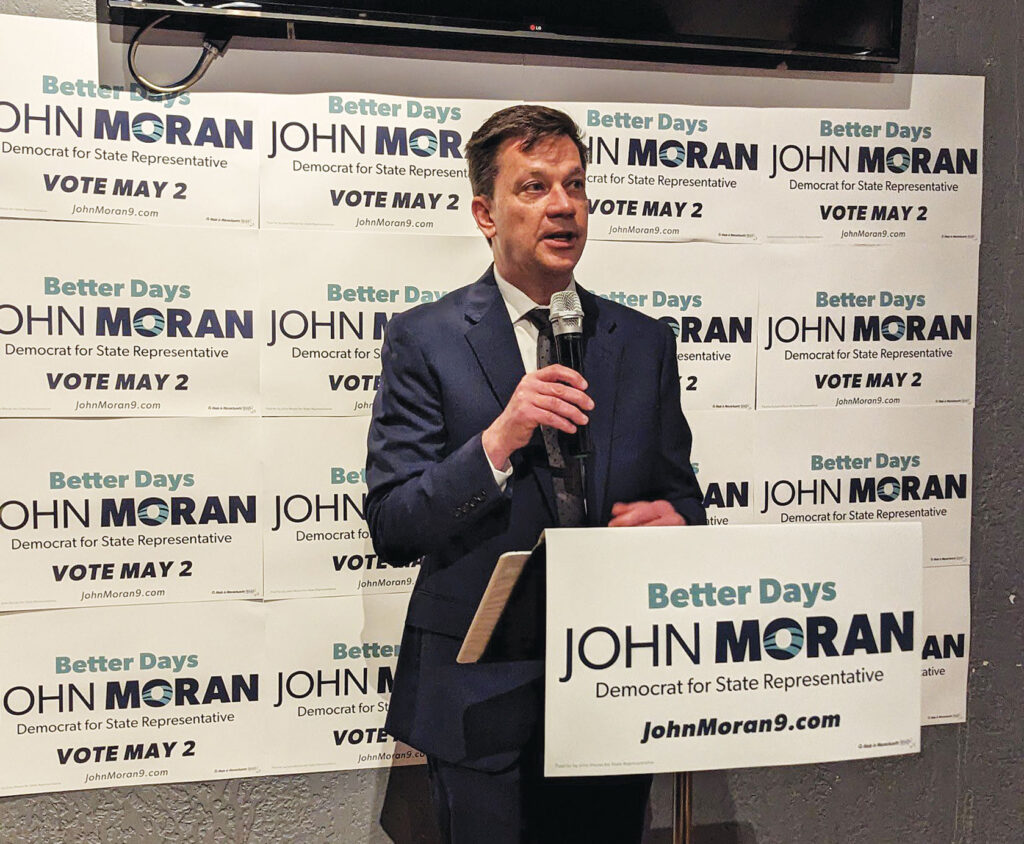
John Moran is the presumptive new state representative for the 9th Suffolk district based in the South End. He won the Democratic primary on May 2, and no other candidate is on the ballot for the general election May 30. Barring an unsuccessful write-in candidacy, Moran will succeed Jon Santiago, who resigned to take a position in the Healey administration.
In the following Q&A, Moran discussed his main agenda, next steps following the primary election and commitment to diversity in his campaign. Excerpts have been edited for clarity.
What are your top issues for this district?
Obviously, housing is an important component. And we’re in a crisis. If you’ve talked to all areas of our community, whether it be in the Polish triangle in Roxbury or in the South End, we need to protect our most vulnerable to make sure that folks that already have affordable housing are able to stay there and have protections. But also keep thinking about ways you can leverage state funding for affordable ownership, such as the Commonwealth Builder fund. There’s a project right now at 599 Northampton Street, and it’s an example of how we could also lift up our communities through not only affordable rentals, which we absolutely need more, but also through ownership. So affordable housing is definitely there.
Another issue is the mental health and addiction crisis centered around Mass. and Cass. I just need to be a partner as much as I possibly can, should I be elected, with the city, with the governor’s office and anybody that’s trying to help that situation. Mass. and Cass is one of the things I campaigned on and that’ll be one of the two things I think about every morning when I wake up to make sure that we can bring additional solutions such as a recovery center, other ways of helping people, such as some other elements of decentralization so that we can get people help. And I feel that being a partner and really using my problem-solving skills is really crucial in this case.
For the 9th district, you are most likely to be the first white person to represent this district in nearly 50 years. What have you done and what do you plan to do to address this community, which is largely people of color, about the issues you’re passionate about, and how you plan to represent them?
I acknowledge that it’s a heavy burden. It’s one that I’m going to be focused on every day. The legends like Mel King, Byron Rushing and the depths of work that John Santiago did. What they focused on is the same thing that I’ll focus on, which is helping our most vulnerable, and to do that you need to be present. So already, I’m starting a Better Days Listening tour to understand the most vulnerable communities. I’ve already met with Vanessa Calderon and Aviva (Psychology Services). I met with the folks in Vine Street Community Center. I’m heading to the Orchard Gardens Association next week to make sure that I’m listening, understanding and learning about the needs of those communities. I’ve also already met with several times and continued dialogue with Nikki Fortes of Tent City, and I plan to meet with that organization’s association president in the near term. These are just examples, but there are many other communities that I want to meet with. The number one job is be there, get a regular cadence of meetings, make sure you’re listening. My staff is going to look like the community. I’m insisting on having someone that is Spanish speaking that represents one of the many communities, potentially IBA (Inquilinos Boricuas en Acción), that they can be by my side daily, making sure that we’re listening to the needs of people of color and the community, and making sure that this role should be centered first and foremost on helping those at their most vulnerable.
What steps have you taken to make sure that your campaign represents a diverse set of voices?
From the campaign perspective we definitely had intentionally reached out to all the community groups we possibly could. From a Roxbury perspective, I was fortunate enough to have the input and help from D7 Advisory Council members who went out and campaigned with me. We went door-to-door together. And then from a strategy perspective going forward, I’ll have a diverse advisory group that helps me understand the day to day challenges of the communities that we represent. The campaign will turn into kind of an advisory group plus what I actually do every day, which is making sure that the most vulnerable are listened to.
What are the next steps until the May 30 final election?
What I’m trying to do is make sure that I’m present at all of the relevant events. Even before the election, I [was] sort of working on a calendar of events that I can make sure I’m there. This past weekend, for example, I was at the South End baseball opening, which is a key community event in terms of representing the great diversity of our District 9 and it was wonderful to be there. This weekend, I’ll be going to a Mother’s Day peace walk. [I am] making sure I’m at those events and talking to people, listening to people, understanding what their concerns are. In practicality, I also have to knock on doors to make sure people get out to vote, make sure that folks know about the election. Those are important things to do as well. It’s a good opportunity to hear directly from potential future constituents. Everybody has been working hard and doing their day jobs, but a lot of folks have great ideas and I’ve been really impressed by talking to people from every area of our just ever diverse district.






